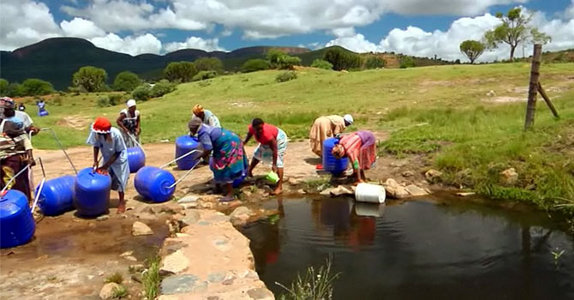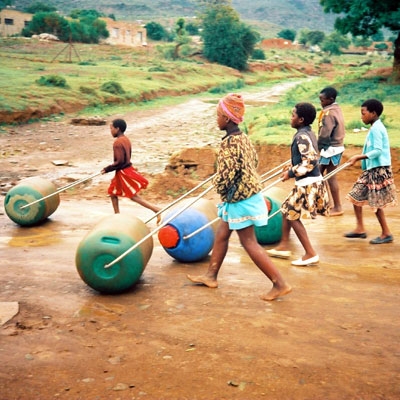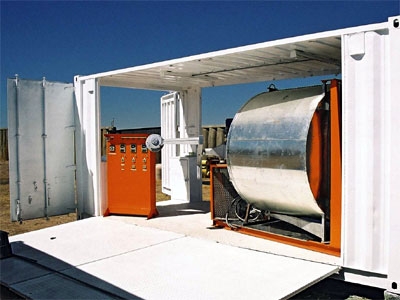Difference between revisions of "Hippo roller"
| Line 1: | Line 1: | ||
[[Image:hippo roller.jpg|thumb|right|350px|The hippo roller. Photo: [http://hipporoller.org/ hipporoller.org]]] | [[Image:hippo roller.jpg|thumb|right|350px|The hippo roller. Photo: [http://hipporoller.org/ hipporoller.org]]] | ||
| − | [[Image:hippo roller 2.jpg|thumb|right|350px|The Hippo Water Roller Project is in the process of appointing local manufacturers in other countries where there is sufficient demand for Hippo rollers to justify the setup cost. Photo: [http://www.hipporoller.org/project/about-us hipporoller.org]]] | + | [[Image:hippo roller 2.jpg|thumb|right|350px|The Hippo Water Roller Project is in the process of appointing local manufacturers in other countries where there is sufficient demand for Hippo rollers to justify the setup cost. <br>Photo: [http://www.hipporoller.org/project/about-us hipporoller.org]]] |
The hippo water roller is a barrel-shaped container. It improves access to water by rolling along the ground. It was specifically designed to alleviate the suffering caused by traditional methods of transporting water in buckets. | The hippo water roller is a barrel-shaped container. It improves access to water by rolling along the ground. It was specifically designed to alleviate the suffering caused by traditional methods of transporting water in buckets. | ||
Revision as of 05:12, 29 August 2012


Photo: hipporoller.org
The hippo water roller is a barrel-shaped container. It improves access to water by rolling along the ground. It was specifically designed to alleviate the suffering caused by traditional methods of transporting water in buckets.
Its innovative design provides for a large drum capacity of 90 litres / 24 gallons. Far less effort is required to roll the heavy weight of water (90kg / 200lbs) along the ground than carrying the traditional 20-liter (5-gallon) buckets on the head. The effective weight on level ground is just 10kg (22 pounds).
Currently, all hippo rollers are manufactured in and shipped from south africa. However, exporting completed rollers is expensive, often doubling the cost. A mobile manufacturing unit has been introduced, whereby rollers can be built locally and at a lower landed cost.
Global and local impact
The aim of the Hippo Water Roller Project is to reduce the number of people without adequate access to water by 1% = 10 million people. So far rollers have been distributed to 21 African countries as well as India, Mexico and South America.
As of June 2012, approximately 42,000 Hippo rollers have been distributed in 21 countries directly benefiting in excess of 300,000 people. 95% of these rollers have been donated or sponsored by corporate businesses as part of their social responsibility programs.
Community rollout
- Sponsorship funding is secured and a recipient community is identified with or without the sponsor.
- The project is introduced to the benefitting community leadership and a mandate to proceed is obtained.
- The handover date is set, and on completion of production, the rollers are delivered to the site.
- At the handover ceremony, community leaders and invited dignitaries address the beneficiaries - Sponsors are encouraged to participate.
- Gratitude is expressed by the community through song and dance routines.
- Rollers are handed over to community and/or household representatives in a predetermined and controlled manner.
Ownership
Beneficiaries are encouraged to contribute towards the cost in cash or in kind as they are able. This promotes a sense of ownership and value. Consequently the rollers last much longer. Any funds collected remain in the community for the benefit of all.
Local Manufacturing

Exporting completed Hippo Water Rollers to other countries where they are needed is expensive, often doubling the cost of a Hippo roller. Limited quantities fit into a container which severely impacts on shipping costs.
It is more cost effective over the long term to ship one container including a small manufacturing machine and then on-going raw materials as required.
Neighbouring countries are more effectively serviced by a local manufacturer. Local NGO’s requiring small quantities can more easily afford Hippo rollers.
Training in the operation and maintenance of the machine is conducted in South Africa.
TO PURCHASE OR LEARN ABOUT LOCAL MANUFACTURING: Hipporoller.org
